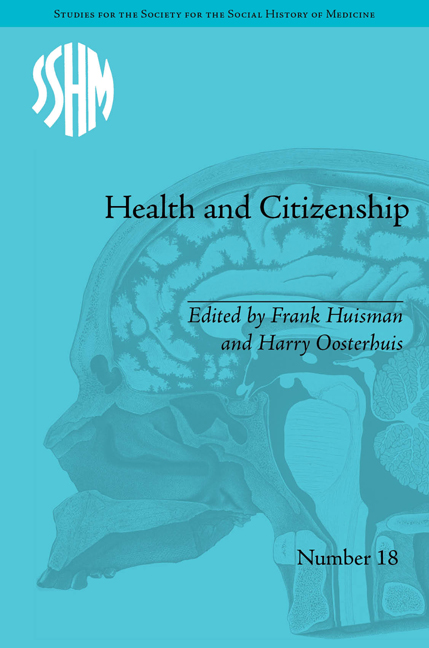Book contents
- Frontmatter
- CONTENTS
- Acknowledgements
- List of Contributors
- The Politics of Health and Citizenship: Historical and Contemporary Perspectives
- Part I Liberal Citizenship and Public Health
- 1 Before l'État-Providence: Health and Liberal Citizenship in Revolutionary and Post-Revolutionary France
- 2 An Oyster Odyssey: Science, State and Commerce in England, 1895–1905
- 3 Monopoly or Freedom of Healing? The Role of Medicine in a Modernizing Society
- 4 Ambivalences of Liberal Health Policy: Lebensreform and Self-Help Medicine in Belgium, 1890–1914
- Part II Social Citizenship: Health in the Welfare State
- Part III Neo-Republican Citizenship: Health in the Risk Society
- Notes
- Index
4 - Ambivalences of Liberal Health Policy: Lebensreform and Self-Help Medicine in Belgium, 1890–1914
from Part I - Liberal Citizenship and Public Health
- Frontmatter
- CONTENTS
- Acknowledgements
- List of Contributors
- The Politics of Health and Citizenship: Historical and Contemporary Perspectives
- Part I Liberal Citizenship and Public Health
- 1 Before l'État-Providence: Health and Liberal Citizenship in Revolutionary and Post-Revolutionary France
- 2 An Oyster Odyssey: Science, State and Commerce in England, 1895–1905
- 3 Monopoly or Freedom of Healing? The Role of Medicine in a Modernizing Society
- 4 Ambivalences of Liberal Health Policy: Lebensreform and Self-Help Medicine in Belgium, 1890–1914
- Part II Social Citizenship: Health in the Welfare State
- Part III Neo-Republican Citizenship: Health in the Risk Society
- Notes
- Index
Summary
The suggestion that public health policies in liberal-democratic Europe have never been a consensual affair is not new. Although such policies implied ever increasing levels of government intervention from the late nineteenth century until the 1980s, the limits of this intervention remained a matter of political and social controversy throughout the twentieth century. At the same time, discourses of public health implied varying ranges of individual responsibility. These discourses were conceptually intertwined with top-down policies, but did not exclude the flourishing of liberal cultures of (medical) self-help. Diverging conceptions of the state and the individual revolved around different conceptions of society – the so-called ‘social organism’. Since the individual body's condition, it was believed, ultimately affected the man-made body politic, health care became a matter of political and personal regulation, informed by philosophies of interventionist utilitarianism and laissez-faire alike. In this chapter, the conceptual instability of liberal-democratic health policies will be studied in its early stages, through the example of health reform in fin-de-siècle Belgium.
Because Belgium was arguably the most liberal country in nineteenth-century continental Europe, the ambivalences of liberalism became particularly obvious. The guiding principle behind the Belgian constitutional system was the wish to guarantee ‘liberty in everything and for all’ (Liberté en tout et pour tous), which implied a deep-seated suspicion of a coercive state.
- Type
- Chapter
- Information
- Health and CitizenshipPolitical Cultures of Health in Modern Europe, pp. 101 - 118Publisher: Pickering & ChattoFirst published in: 2014



